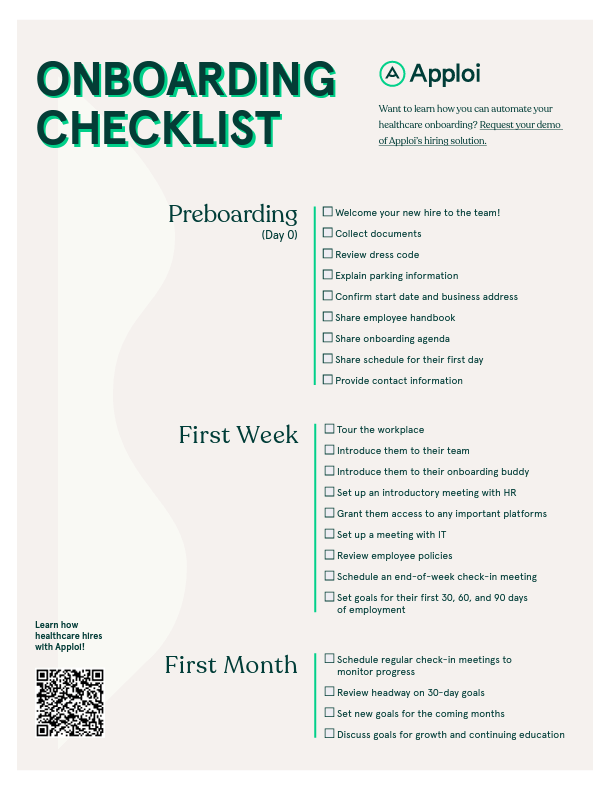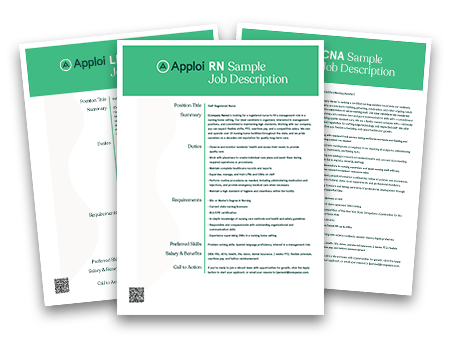Nursing Home Hiring: Tips for Recruiting 7 Common Roles
If you’re recruiting for skilled nursing facilities, you’re fighting for the same candidates as other healthcare businesses—or different industries entirely. In this guide, we review seven of the most common clinical and non-clinical roles and tips to help improve your nursing home hiring.

In This Series
- Staffing Guide for Skilled Nursing Facilities
- Seven Ways to Improve Your Skilled Nursing Orientation
- Nursing Home Hiring: Tips for Recruiting 7 Common Roles
- Healthcare Terminology for Skilled Nursing HR
- Skilled Nursing Retention: 10 Tips for Reducing Turnover
- Skilled Nursing Compliance Q&A with Healthcare Law Attorneys

FREE INTERACTIVE ONBOARDING CHECKLIST
Specifically designed for Skilled Nursing Facility Roles
Seven Common Roles and How to Recruit Them
There isn’t time in the day to review every single role you might hire. But we’ve highlighted recruitment tips for seven of the most common roles. Here’s how you can improve your nursing home hiring process.
1. Administrators
Licensed nursing home administrators (LNHAs) supervise all operations in skilled nursing facilities. Because LNHAs are responsible for ensuring that administrative and clinical work flows smoothly, you need a candidate who is organized and detail-oriented. These workers should also possess the ability to put people first, implement and monitor new system technologies, and understand how to navigate compliance issues.
According to Elizabeth McLaren, associate vice president of healthcare at Covenant Retirement Communities, employers should look for LNHAs with a “system and process brain.”
“We’ve had a lot of success developing relationships with colleges that have healthcare administrator programs,” McLaren added. “Some buildings need a more seasoned administrator, but we’ve also had success bringing in someone right out of school with a fresh perspective, drive, and enthusiasm.”
While administrators have to balance many tasks, often the best hires are people excited about learning on the job, especially considering how rapidly things change. To put that another way, nursing home administrators are a great role to recruit directly from schools.
Tips for Recruiting Administrators to Your Nursing Home
- Don’t be afraid of new talent. Try recruiting directly from educational programs.
- Implement a volunteer or internship program that can help you identify potential candidates before you’re even hiring.
- Before extending an offer, give candidates an opportunity to meet with leaders of multiple teams, including clinical and non-clinical ones. Administrators’ work lives are all about transparency and teamwork. Showing off your team and culture will get you to a yes that much more quickly.
FREE TEMPLATES
Create effective job posts to attract more candidates with our free templates for RN, CNA, and LPN job descriptions
2. Certified Nursing Assistants
Have you ever sent an offer letter to a certified nursing assistant (CNA) just to hear that they just started work with a competitor? You’re not alone. CNAs are some of the most in-demand workers you’re likely to employ.
Since CNAs are in such high demand and short supply, your recruiting strategy should focus on two things. First, make the most of your existing network. And second, hire quickly, so you can avoid the nightmare of offering job after job to candidates who have already accepted other offers.
Increasingly, facilities are also looking to in-house training programs to support non-clinical workers who are interested in becoming CNAs. Your mileage will vary with this. Some facilities need CNAs to start work already prepared to offer ADL care, but if you have any flexibility, in-house training can be a great way to increase your candidate pool.
Tips for Recruiting CNAs to Your Nursing Home
- Train your own candidates in-house.
- If you’re able to offer support to CNAs who want to return to school to become LPNs, make this clear in the job ad.
- Create a culture of appreciation, and show it off. CNAs are often underappreciated. If you can demonstrate that you go out of your way to celebrate CNAs, candidates are more likely to get excited about joining your facility.
- Focus on increasing your speed-to-hire to secure the best candidates available.

3. Cooks
Cooks in skilled nursing facilities need to be certified in food handling, knowledgeable about geriatric dietary needs (although this may be determined by a dietician), and willing to prioritize accuracy and documentation. Time management is key in skilled nursing facilities, as meal times might not be flexible.
If you’re hiring cooks who haven’t worked in healthcare environments before, they might find their work is different in a few surprising ways. One of these is regulation. Meals in nursing homes are regulated by CMS, so any changes will have to be documented appropriately. To this end, look for cooks who are willing to prioritize accuracy and recordkeeping. There’s still room to be creative, but protecting patients’ routines and safety comes first.
Tips for Recruiting Cooks to Your Nursing Home
- Research wages and benefits for local food service positions. Offer compensation that is competitive not only for the healthcare field, but the culinary field as well.
- Familiarize yourself with local culinary businesses’ hiring cycles. If possible, try to post opportunities 3-6 months after the busiest hiring period for these businesses.
- Highlight the stability that your business can offer, which may be appealing to a cook in a most seasonal field.
- Advertise pathways for growth. For instance, make it clear if an entry-level position could eventually lead to a worker running their own kitchen.

4. Housekeepers
Legally speaking, housekeepers don’t need any specific training to work in a nursing home. This means that employers have some flexibility in how they recruit. You may be able to hire teenagers and part-time workers along with full-timers, which can expand your reach substantially.
But the fact that most housekeepers don’t specialize in healthcare can also present its own challenge. You may be competing with entirely different industries, like cleaning agencies and hospitality. To come out ahead, you’ll need to highlight the benefits of working in your facility and in healthcare at large.
What, exactly, attracts housekeepers to work in skilled nursing facilities? According to Shirley Goral, a housekeeper at Selly Wood House nursing home, the best parts of the job are “chatting to residents, making them laugh and doing the little things that make a difference to their lives.”
“As people grow older, they can sometimes be dismissed by society but they have so much to give and I love hearing about their lives. It’s the residents that make my job so interesting and it’s why I’ve stayed here for so long.”
What to Highlight While Recruiting Housekeepers to Your Facility
- Stable and routine work. Employment in a skilled nursing facility may be more reliable than in a private housekeeping service, where demand could change dramatically from month to month or even day to day.
- Meaningful interactions with patients and residents.
- Competitive salaries and benefits.
- An opportunity to support your mission and benefit a vulnerable community.
5. Licensed Practical Nurses
Licensed practical nurses (or LPNs) are also in great demand. LPNs can find work in both acute and post-acute settings. So what can give you an edge over other healthcare businesses?
For most LPNs, the greatest benefit of working in a skilled nursing facility is the residents themselves. Workers can get to know their patients and become an important part of their lives—something that’s possible, but more challenging, in hospital settings.
While skilled nursing comes with its own stressors, you also may be able to recruit LPNs who have experienced burnout in hospitals and are looking for a change of pace. If you can promise a culture of support (meaning more frequent check-ins, fair pay, and adequate time off), your facility may look like a welcome relief.
Since LPNs work closely with physicians and RNs, they are often strongly affected by their workplace culture. Efforts to appreciate LPNs, from internal promotions to a periodic coffee run, can help them feel assured you’ll value their contributions.
Tips for Recruiting LPNs to Your Nursing Home
- Establish a social media presence with a warm and inviting voice.
- Encourage your staff to submit referrals.
- Build a culture that respects LPNs just as strongly as RNs and physicians.
- Offer support with tuition reimbursement or student loan assistance to help LPNs advance in their careers (or just escape the weight of debt).
6. Occupational Therapists
Occupational therapists help patients regain independence by addressing physical and cognitive issues that could be limiting their daily activities. This includes physical therapists, geriatric therapists, mental health therapists, and more.
You can find specialized occupational therapists through your regular channels (such as job boards and social networks), but it’s also worth attending and recruiting at industry events. In the world of highly specialized occupations, networking and referrals can be extremely fruitful.
Roles for occupational therapists are growing quickly. Currently, about half of these workers are employed in hospitals. But skilled nursing facilities might be a strong choice for workers who haven’t fit in comfortably to acute workplaces due to stress, facility size, or company culture.
Tips for Recruiting Occupational Therapists to Your Nursing Home
- Attend professional events to network with occupational therapists in person.
- Tailor your job posts with relevant SEO keywords. There are many different kinds of occupational therapists—make sure you’re using the correct language.
- Ask around. In a field with so many specialities, there’s a good chance your next hire will come from a referral. Ask other occupational therapists to connect you with candidates seeking their next opportunity.
6. Registered Nurses
Your strategy for recruiting registered nurses (RNs) can be very similar to your strategy for recruiting LPNs. Once again, you’ll want to emphasize culture, employee support, and quality of care in your facility.
One of the most common reasons RNs quit is the sense that they’re unable to do the work they were hired for. Often, this is tied to external pressure. It’s not easy to take your time with a patient if you’re always rushing to the next appointment. And it’s hard to feel satisfied at work if stress and exhaustion are chipping away at your morale.
Like any employee, RNs want to do work they can feel proud of. If you can promise RNs that they’ll have enough time with individual patients, that’s already a huge point in your favor. This is certainly easier said than done, but it’s often more possible for RNs to take their time in a post-acute setting than in a hectic environment like a hospital.
Tips for Recruiting RNs to Your Nursing Home
- Treat them to lunch. Even for candidates who are excited about a job, it can be tough to be equally excited about an interview. Make the interview more appealing by having it over a burger or a cup of coffee.
- Support lateral career moves. Offer RNs administrative training and options to work from home for certain telehealth-focused shifts.
- Reconnect with past employees and applicants. Since RNs have relatively high turnover, you may be able to recruit from your former talent pool.
Build Your Toolkit for Nursing Home Hiring
Your nursing home hiring strategy might be complex, but it doesn’t have to be overwhelming. Using Apploi’s suite of tools, you can source candidates, streamline hiring, and onboard new recruits from a single user-friendly platform.
Interested in learning more about how you can recruit, hire, and onboard nursing home staff quickly? Contact us today for a free demo of our healthcare hiring software.
In This Series
- Staffing Guide for Skilled Nursing Facilities
- Seven Ways to Improve Your Skilled Nursing Orientation
- Nursing Home Hiring: Tips for Recruiting 7 Common Roles
- Healthcare Terminology for Skilled Nursing HR
- Skilled Nursing Retention: 10 Tips for Reducing Turnover
- Skilled Nursing Compliance Q&A with Healthcare Law Attorneys


